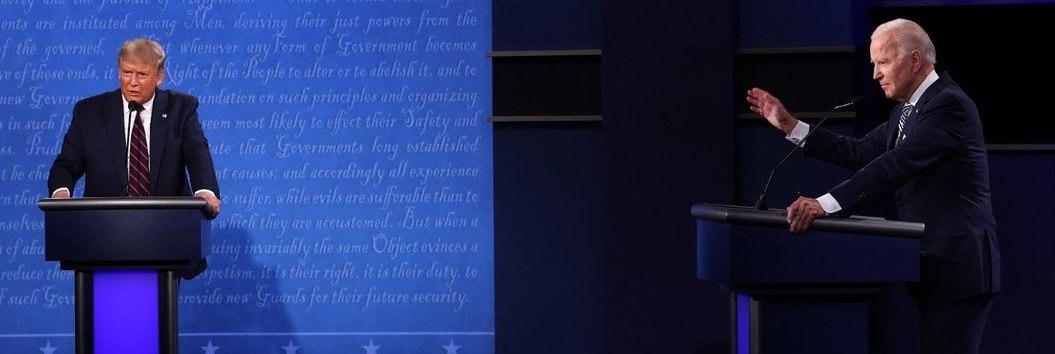Recent polling by the Economist and YouGov finds that Americans aren't entirely enthusiastic about the prospect of a 2024 rematch between 2020's two leading presidential candidates. In our latest poll, only 27% of Americans, including 46% of Democrats, say they want President Joe Biden to run for reelection in 2024. A similar share — 28% — want former President Donald Trump to run again, including 52% of Republicans.
Other than Biden and Trump, who do Americans want to run for president two years before the 2024 election? In a September poll, we asked Americans to tell us in their own words which Democratic and Republican candidates, if any, they would like to see run for president, other than Biden and Trump. Based on responses to these questions, as well as other sources, we developed two lists of 20 political figures, one for each party. We asked Americans two questions about each group in an October poll, two weeks before the 2022 congressional elections. First, we asked them to select which of the candidates they would like to see run in each of the Democratic and Republican presidential primaries — allowing them to choose as many candidates as they desired. Then, for each party we asked people who selected more than one candidate to choose the one that they preferred most as the party's nominee. While anyone could give their preferences for candidates from each major party, we're publishing findings based specifically on preferences of members of each party for their own primary and nominee.
While 2020's candidates each top the list of their own party's choices, neither is the top choice of a majority — with Biden lagging Trump in support from his own party. Fewer than half of Democrats even want the president to run in the primary. Trump, though, has a much clearer top rival for party support.
Democratic candidates
Among potential Democratic candidates, Biden leads as both a candidate Democrats want to run in the primary (44%) and the candidate they would choose as their nominee (26%). Among other candidates many Democrats want to see in their primary field, Vice President Kamala Harris and Secretary of Transportation Pete Buttigieg lead the way, each getting support from 31%. Around one in four want each of 2016 nominee Hillary Clinton (26%), Texas gubernatorial candidate Beto O'Rourke (24%), Senator Elizabeth Warren (24%), Senator Bernie Sanders (23%), and Georgia gubernatorial candidate Stacey Abrams (23%) to run. Each of the other potential primary candidates asked about were chosen by 21% or fewer Democrats.
While Biden is the top pick of just 26% of Democrats, no other Democratic political figure has consolidated nearly as much support. Buttigieg and Harris, the next closest contenders, both fall below 10%.
Republican candidates
Like Democrats, Republicans prefer the man who has already done the job above all others for their 2024 presidential candidate. Three in five Republicans (61%) say they'd like to see Trump run in the Republican primary, and 44% say they'd like him to be the nominee over all others asked about. Florida Governor Ron DeSantis is not far behind Trump in share of Republicans who want him to run in the primary: 54% say they want DeSantis as a primary option, roughly twice the share who want Senator Ted Cruz (27%) in the primary field and more than double Donald Trump Jr.'s 21%. Trump's lead over DeSantis in top choice for the nomination is a wider 18 percentage points; DeSantis is the choice of 26%. Yet that is far more than the Democratic preference for any potential challenger to Biden.
— Carl Bialik contributed to this article
Methodology: This U.S. News survey was conducted by YouGov using a nationally representative sample of 1,000 U.S. adult citizens interviewed online from October 25 - 27, 2022. This sample was weighted according to gender, age, race, education, 2020 election turnout and Presidential vote, baseline party identification, and current voter registration status. Demographic weighting targets come from the 2019 American Community Survey. Baseline party identification is the respondent’s most recent answer given prior to March 15, 2022, and is weighted to the estimated distribution at that time (33% Democratic, 28% Republican).
Image: Getty










